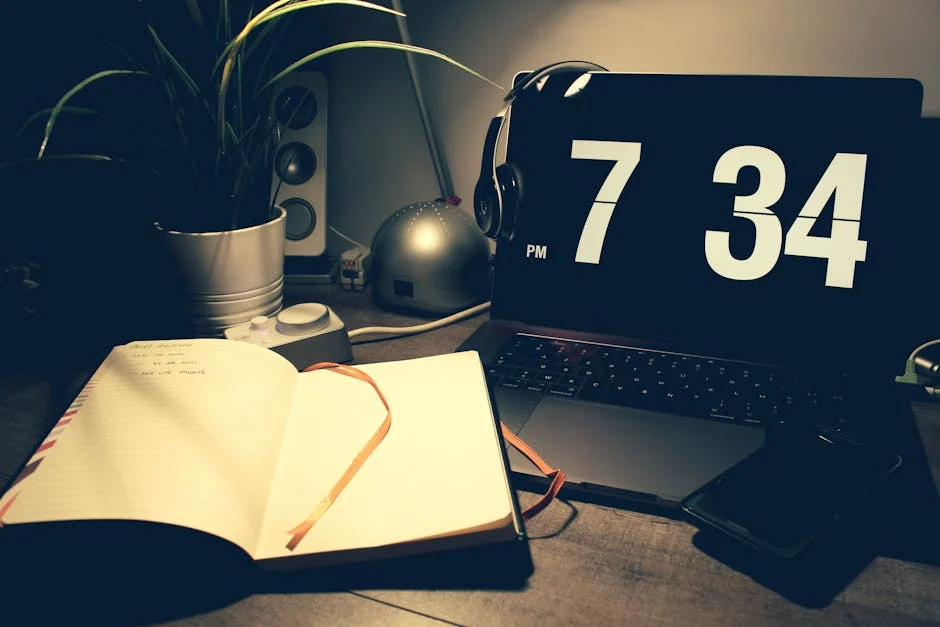Staying focused at work can feel impossible when emails pile up, notifications buzz constantly, and colleagues drop by your desk. But the good news is that improving your concentration doesn’t require overhauling your entire routine. I’ve learned that small, intentional changes to how you manage your time, workspace, and energy can make a significant difference. If you want to learn more about the fundamentals of concentration, our guide on how to stay focused is a great starting point. Whether you’re working from home or in a busy office, these strategies will help you minimize distractions, maintain your attention, and get quality work done.
Understanding Why You Can’t Focus at Work
Before we jump into solutions, it helps to know what you’re up against. If you’re finding it hard to concentrate, you’re not alone. The modern work world is practically designed to break our attention. Often, the culprits are a mix of things: mental fatigue from juggling too many tasks, the endless stream of digital pings, a poor night’s sleep, or even just a cluttered desk.
Take a moment to think about what trips you up the most. Is it the constant Slack notifications? The temptation to check your phone? Or maybe feeling overwhelmed by a massive project? Pinpointing your personal focus-killers is the first step toward fixing them.

Signs Your Focus Is Slipping
Not sure if your focus is truly off? See if any of these feel familiar:
- You find yourself switching between tasks every few minutes without finishing anything.
- Simple jobs seem to take forever to complete.
- You feel completely drained by noon, even if you haven’t done much.
- You keep re-reading the same email because the words just aren’t sinking in.
- Deadlines are consistently sneaking up on you.
Recognizing these signs isn’t about feeling bad; it’s about seeing a clear signal that your brain needs a different approach.
How Modern Workplaces Impact Concentration
Our work environments play a huge role. Open-plan offices, while great for collaboration, can be a nightmare for concentration. There’s also the expectation to be available 24/7, leading to back-to-back virtual meetings and a feeling that you can never truly disconnect. This digital overload creates a state of continuous partial attention, where we’re aware of everything but deeply focused on nothing. Understanding this context helps us be kinder to ourselves and more strategic with our solutions.
Create a Distraction-Free Workspace
Your physical environment sends powerful cues to your brain. A messy, chaotic space often leads to a messy, chaotic mind.
Start by tidying your desk. A clear space reduces visual clutter and helps you think more clearly. If possible, position your desk away from high-traffic areas. And don’t underestimate the power of good noise-canceling headphones; they are a universal sign for “I’m in the zone.” Whether you’re at home or in the office, creating a dedicated “focus zone” helps signal to your brain that when you’re here, it’s time to work.

Managing Digital Distractions
Digital interruptions are often the biggest focus thieves. The solution is to take back control.
Turn off all non-essential notifications on your computer and phone. Seriously. You don’t need a pop-up for every email or social media comment. Use website blocker apps during your core work hours to prevent mindless scrolling. Close all browser tabs that aren’t related to your current task. And when you need to do deep work, put your phone in another room. It’s not rude to disconnect for an hour; it’s productive.
Setting Boundaries with Coworkers
People can be the best and worst part of work. To minimize interruptions without being unfriendly, try a few things. Wearing headphones is a great visual cue. You can also block out “focus time” on your shared calendar so people know not to schedule meetings then. A simple, polite “Hey, I’m trying to finish this report right now, can I catch up with you in an hour?” works wonders. It communicates your needs clearly and respectfully.
Use Time Management Techniques
Structuring your day intentionally is one of the most effective ways to protect your focus. Instead of reacting to whatever comes your way, you can create a framework that supports deep work.
The Pomodoro Technique
This is a favorite of mine because it’s so simple. You work in a focused 25-minute sprint, then take a 5-minute break. After four of these “Pomodoros,” you take a longer break of 15-20 minutes. This method works because it aligns with our brain’s natural ability to focus in short bursts and prevents burnout by building in regular rest.
Time Blocking for Deep Work
Time blocking is where you schedule your entire day into specific blocks of time, including deep work sessions for your most important projects. This means treating your high-priority tasks with the same importance as a meeting. By walling off 60-90 minutes for uninterrupted work, you give your brain the space it needs to tackle complex problems without being pulled away by emails or minor tasks.
Single-Tasking Over Multitasking
The idea that we can effectively multitask is a myth. When we think we’re multitasking, we’re actually just “task-switching” very quickly, and each switch costs us mental energy and time. Instead, commit to single-tasking. Focus on one thing from start to finish. You’ll produce higher-quality work and, surprisingly, get more done.
Prioritize and Plan Your Tasks
Walking into your workday without a plan is like setting sail without a map. A few minutes of planning can save you hours of wasted effort.
Before you start your day, create a short list of 3-5 priorities. What are the most important things you need to accomplish? Tackle your most challenging task first, when your energy and willpower are at their peak. For big projects that feel overwhelming, break them down into smaller, manageable steps. Having a clear plan not only guides your work but also helps you see the connection between your daily tasks and the bigger picture, making it easier to stay focused on your goals.

Take Regular Breaks
Breaks aren’t a sign of slacking; they are essential for sustained performance. Your brain is a muscle, and it gets tired. Pushing through for hours on end only leads to diminishing returns.
Step away from your screen for 5-10 minutes every hour. Walk around, do some simple stretches, get a glass of water, or just look out the window. These micro-breaks help reset your attention and prevent the dreaded afternoon slump.
Don’t Skip Your Lunch Break
I can’t stress this enough: take a real lunch break, away from your desk. Eating while answering emails isn’t a break. Your brain and body need a proper chance to refuel. Skipping lunch or eating at your desk can lead to decision fatigue and a massive drop in productivity later in the day. Schedule it in your calendar if you have to.
Practice Mindfulness and Meditation
Mindfulness is the practice of paying attention to the present moment without judgment. It’s like a workout for your brain’s focus circuits. You don’t need to become a meditation guru. Starting with just 3-5 minutes of guided meditation from an app each morning can help you start the day with more calm and clarity. When you feel overwhelmed at work, try a simple breathing exercise: inhale slowly for four counts, hold for four, and exhale for six. It’s a quick way to hit the reset button.
Support Your Focus with Healthy Habits
Your ability to concentrate at work is directly tied to your lifestyle outside of it. You can’t expect to have laser focus if you’re running on empty. Prioritize the basics:
- Sleep: Aim for 7-8 hours of quality sleep per night.
- Nutrition: Eat balanced meals to maintain steady energy levels and avoid sugar crashes.
- Hydration: Dehydration can cause brain fog and fatigue, so keep a water bottle on your desk.
- Movement: Regular physical activity, even a brisk 20-minute walk, can significantly boost cognitive function for hours.
Implementing these habits consistently can significantly support work life balance for women, especially when managing multiple responsibilities at home and in the office.
The Sleep and Focus Connection
Sleep is when your brain cleans house, consolidates memories, and recharges. When you don’t get enough, your prefrontal cortex—the part of your brain responsible for attention, planning, and impulse control—struggles to function properly. To improve your sleep, try to stick to a consistent bedtime, avoid screens for an hour before bed, and create a relaxing wind-down routine.
Train Your Brain to Focus Better
Focus is a skill, not a fixed trait. Like any skill, it can be strengthened with practice. Think of it as building mental muscle.
Start small. Try reading a book for 15 minutes without any distractions. Do a puzzle. The goal is to gently stretch your attention span over time. Gradually increase your “focus intervals,” from 25 minutes to 30, then 40. By consistently practicing sustained attention on one thing, you can actively increase your attention span and make focusing at work feel less like a battle.

When to Talk to Your Manager
Sometimes, the problem isn’t just you—it’s your workload or the company culture. If you’ve tried these strategies and still feel constantly overwhelmed and unable to focus, it might be time to talk to your manager.
Frame the conversation constructively. Instead of saying “I can’t focus,” try something like, “I’m working on improving my productivity and I’ve noticed that back-to-back meetings are making it hard to get deep work done. Could we explore solutions, like creating a ‘no-meeting’ block on Wednesday mornings?” A good manager will want to help you succeed.
Final Thoughts
Learning how to stay focused at work is a journey, not a destination. Some days will be better than others. The key is to be patient with yourself and celebrate small wins. By creating a better environment, structuring your time, and taking care of your brain, you can reclaim your attention and find more satisfaction in your work.
For more tips on wellness and productivity, feel free to explore more articles here at www.notonetype.org.


Có thể bạn quan tâm
How to Increase Attention Span: Strategies to Improve Focus
This constant digital buzz makes it incredibly tough to focus on one thing at a...
Nov
How to Stay Focused on Your Goals: 12 Strategies That Actually Work
Staying focused on your goals can feel like trying to walk a straight line in...
Nov
How to Stay Focused When Studying: 12 Techniques That Actually Work
Let’s be real: trying to stay focused while studying can feel like a battle. One...
Nov
How to Stay Focused: 12 Tips to Improve Concentration and Productivity
It feels like a modern-day superpower, doesn’t it? The ability to just sit down and...
Nov